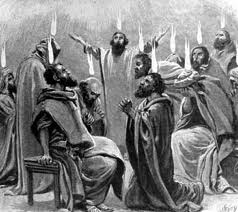John 15:26,27; 16:4b-15
 During a conversation, a parishioner was stunned that I was a Pastor yet could not speak in tongues. I agreed, not with the speaking in tongues bit, but with the being a Pastor bit.
During a conversation, a parishioner was stunned that I was a Pastor yet could not speak in tongues. I agreed, not with the speaking in tongues bit, but with the being a Pastor bit.
Similar, over the years people have asked why it is that the Holy Spirit seems so absent from the Lutheran Church, or more so from a particular congregation in which the questioner has been worshipping, and if we dig a bit into that question, we’ll usually discover that this dissatisfaction with their own congregation has arisen because of a visit to another church’s worship service where it seems clear that the Holy Spirit is really active.
A statement said something like this, “I found that service like a spiritual electric storm: people speaking in tongues and falling over, people laughing, dancing and singing. It was like nothing I’d ever seen. I was freaked out and literally unable to speak for about an hour afterwards. If that was real spirit-filled worship, then it seemed to me that the church I’d grown up in doesn’t have the Holy Spirit”.
An experience that starts them to question whether they are Christian at all; whether the Holy Spirit was actually working in them or the church they belonged to because if the Holy Spirit really is at work in their life then shouldn’t they feel, experience or see more signs that the Holy Spirit is central to their life as a Christian and to those in the church?
It’s a feeling I know all too well, not the feeling of being second rate because I don’t have such outwardly spirit filled surreal “abilitiesâ€, but simply because I still often feel like a prick and having been baptised, how can that be? Baptised mind you not as an infant, but as a 29 year old. Baptised old enough to know, feel and see the before and after of the effects of Baptism and while I can’t remember a lot of my feelings before that day, I must have been one sorry son of a mother if this is the glorious result. Hardly an advertisement for Baptism and the coming of the Holy Spirit.
So what of me, you and our Church-are we full of the Spirit or just kidding ourselves.
To answer questions like this, one of the best places to go to find out more about the Holy Spirit from Jesus himself is in John chapters 14-16 on which does today’s gospel reading come, and so disregarding our own highly acclaimed or lowly disposition of ourselves, let’s hear the truth of the situation from the man himself, Jesus the Son of God who has brought you forgiveness and salvation, who in this Verse and those chapters of scripture teach us that the Holy Spirit’s role and work is not to get us to focus on the Spirit and dazzle us with all kinds of experiences that cause us make these the-be-all and end-all of our Christian faith, but tells us that the task of the Holy Spirit is to draw us to Jesus;
to make Jesus the centre and focus of our lives;
to teach us about Jesus;
and to lead us again and again to Jesus after we have been led astray by the world, or Satan or our own sinful nature. Summarised when Jesus says “the Spirit will “tell you all about me”, “he will give me glory” and “he will reveal to you whatever he receives from me”.
So why at times do I feel such a prick? Why? Because the focus is all wrong. The same misdirected focus that can lead the other way to where one thinks they are some type of law unto themselves immortal super being.
Two different outcomes from the same inwardly focussed photo shopped lives.
A Facebook type of life where I can make myself be whatever I want and Photoshop my life where I’m taller, thinner and have 5,000 friends that are so interested in me that I need to tell them that I just went to the toilet.
A life as stated by a mid-twenties university lecturer who said that in our world of self-focus, it does not allow for the realities of failing or dancing to another’s tune, but only to the tune of self and so hence, given that reality is what we make it, there can be no place for a higher force to answer to or be guided by.
A photo shopped life that made one of my group ask a simple yet complex question.
So what happens when reality hits and it all falls to pieces?
A one worded answer: Suicide.
That’s easy to say from the outside and I know that is far too simple an explanation. Yet it does get to the heart of the Holy Spirit who brings the focus to the help and the truth that is Jesus Christ.
The Holy Spirit that leads us to focus not on self, but to believe and have faith in Jesus. The Holy Spirit that in opposition to our own assessment of self, brings the grace and love of Jesus and reminds and comforts us with the certain knowledge that even when it seems God is far away, or that people don’t care, or that life is throwing at us every hurt and grief that it possibly can, the Holy Spirit points us to the love of our God as shown to us through Jesus death and resurrection.
He assures us that Jesus’ love for us is right there with us in the most severe situations.
He reminds us of the promises that the Scriptures tells us over and over again that the love that God has for us can never be quenched.
He strengthens us and helps us to be confident and strong by pointing us to the cross and reminding us that with Jesus’ we can endure any circumstance and trouble.
And so where is the Holy Spirit working; what is the sign of his presence and his power? Certainly it is not in experiences and large crowds, healings and supernatural gifts – good and God-given as they are. Jesus teaches that the Holy Spirit is wherever he – Jesus Christ – is proclaimed and confessed.
So where is the Holy Spirit working; what is the sign of his presence and his power? He is wherever Christ is being spoken about, wherever the words of Jesus are read and spoken. He is there in all his fullness wherever people worship and pray in the name of Jesus. When you believe and trust in Jesus you have that faith through the Holy Spirit’s work in you and the Holy Spirit filling you that you need not wonder of the Holy Spirit, but understand as Martin Luther who so eloquently stated that if you“ Believe, you’ve got it”
The grace of God the Father given to us in Jesus and brought to us through the Holy Spirit that lets us understand that it does not matter what else we feel, experience or don’t experience. It doesn’t matter whether we are stressed, depressed, average or exhilarated with joy and enthusiasm, but that in all are we covered by the righteousness of our Lord Jesus who says to you-in me regardless of how you see yourself, my Father sees you as his beloved and forgiven child. Saved from ourselves by being saved in Christ is our deal, and in knowing that we need not look in the mirror and see the reflection of what we know or think we know of ourselves, but lift our vision and see a man hanging from a cross look you in the eyes and not ask why did I come for such a person as you, but declare it is for such a person as you that I did come.
The Lord who came for you that He bless you and keep you. That He make His face shine on you and be gracious to you and that He look upon you with His favour and + give you the peace of God which passes all human understanding. Amen.







